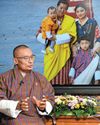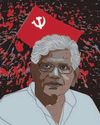Once again, Modi’s charisma and Amit Shah’s organisational skills give the BJP a huge mandate. Nationalism and hindutva, too, played a part, as did the focus on the poor

On May 17, following a gruelling 51-day election campaign, Prime Minister Narendra Modi surprised everyone by joining BJP president Amit Shah at a news conference. He said the country had already decided to re-elect the government with a full majority, which was happening after a long time. “After 1975,” Shah whispered to Modi.
A week later, when the votes were counted, Modi returned with a bigger mandate, like Indira Gandhi did in 1971.
The BJP bettered its 2014 tally by 21 seats, aided by gains in the Hindi heartland, West Bengal and Odisha. The party’s vote share was more than 50 per cent in 17 states.
Modi decimated political dynasties and established his image of being a pro-poor leader who could ensure the country’s safety. “I thank people who gave this mandate to this fakir,” he said after winning.
Notably, the pro-Modi sentiment trumped the poll arithmetic of alliances in states such as Uttar Pradesh and Bihar. The BJP’s aggressive hindutva message, coupled with nationalism, seemed to have even overcome caste loyalties. The party retained 62 of its 71 seats in Uttar Pradesh, brushing aside the SP-BSP alliance, and the NDA nearly swept Bihar, winning 39 of 40 seats there. The absence of Rashtriya Janata Dal founder Lalu Prasad helped the BJP no end.
Modi addressed 142 rallies, most of them in Uttar Pradesh, West Bengal, Bihar and Odisha. Shah addressed 161, and other senior leaders chipped in to take the number to 1,500 rallies in 51 days.
Diese Geschichte stammt aus der June 02, 2019-Ausgabe von THE WEEK.
Starten Sie Ihre 7-tägige kostenlose Testversion von Magzter GOLD, um auf Tausende kuratierte Premium-Storys sowie über 8.000 Zeitschriften und Zeitungen zuzugreifen.
Bereits Abonnent ? Anmelden
Diese Geschichte stammt aus der June 02, 2019-Ausgabe von THE WEEK.
Starten Sie Ihre 7-tägige kostenlose Testversion von Magzter GOLD, um auf Tausende kuratierte Premium-Storys sowie über 8.000 Zeitschriften und Zeitungen zuzugreifen.
Bereits Abonnent? Anmelden

Themes Of Choice
As Savvy Investors Seek New Avenues, Thematic Mutual Funds Are Gaining Popularity

A golden girl
One of India's most formidable beauties passed away earlier this month. The odd thing is she would absolutely hate this obituary; she hated being written about and avoided publicity for all of her nine decades. Indira Aswani was 93 when she died. But anyone who encountered her, even briefly, was in such awe of her grace and poise, and one could not but remember her forever.

The interest in wine is growing delightfully in India
The renowned British wine writer and television presenter Jancis Robinson, 74, recently came to Delhi and Mumbai to reacquaint herself with India's wine industry. This was the Robinson's fourth visit to India; the last one was seven years ago. On this trip, Robinson and her husband, restaurateur Nicholas Lander, were hosted by the Taj Hotels and Sonal Holland, India's only Master of Wine.

United in the states
Indian-Americans coming together under the Democratic umbrella could get Harris over the line in key battlegrounds

COVER DRIVE
Usage-driven motor insurance policies offer several benefits

GDP as the only measure of progress is illogical
Dasho Karma Ura, one of the world's leading happiness experts, has guided Bhutan's unique gross national happiness (GNH) project. He uses empirical data to show that money cannot buy happiness in all circumstances, rather it is family and health that have the strongest positive effect on happiness. Excerpts from an interview:

India is not a controlling big brother
Prime Minister Tshering Tobgay considers India a benevolent elder sibling as the \"big brotherly attitude\" is happily missing from bilateral ties. He thinks the relationship shared by the two countries has become a model of friendship not just for the region, but for the entire world. \"India's attitude is definitely not of a big brother who is controlling and does not allow the little brother to blossom and grow,\" says Tobgay in an exclusive interview with THE WEEK.

Comrade with no foes
Lal Salaam, Comrade Yechury-you were quite a guy!

Pinning down saffron
In her first political bout, Vinesh Phogat rides on the anti-BJP sentiment across Haryana

MAKE IN MANIPUR
Home-made rockets and weapons from across the border are escalating the conflict